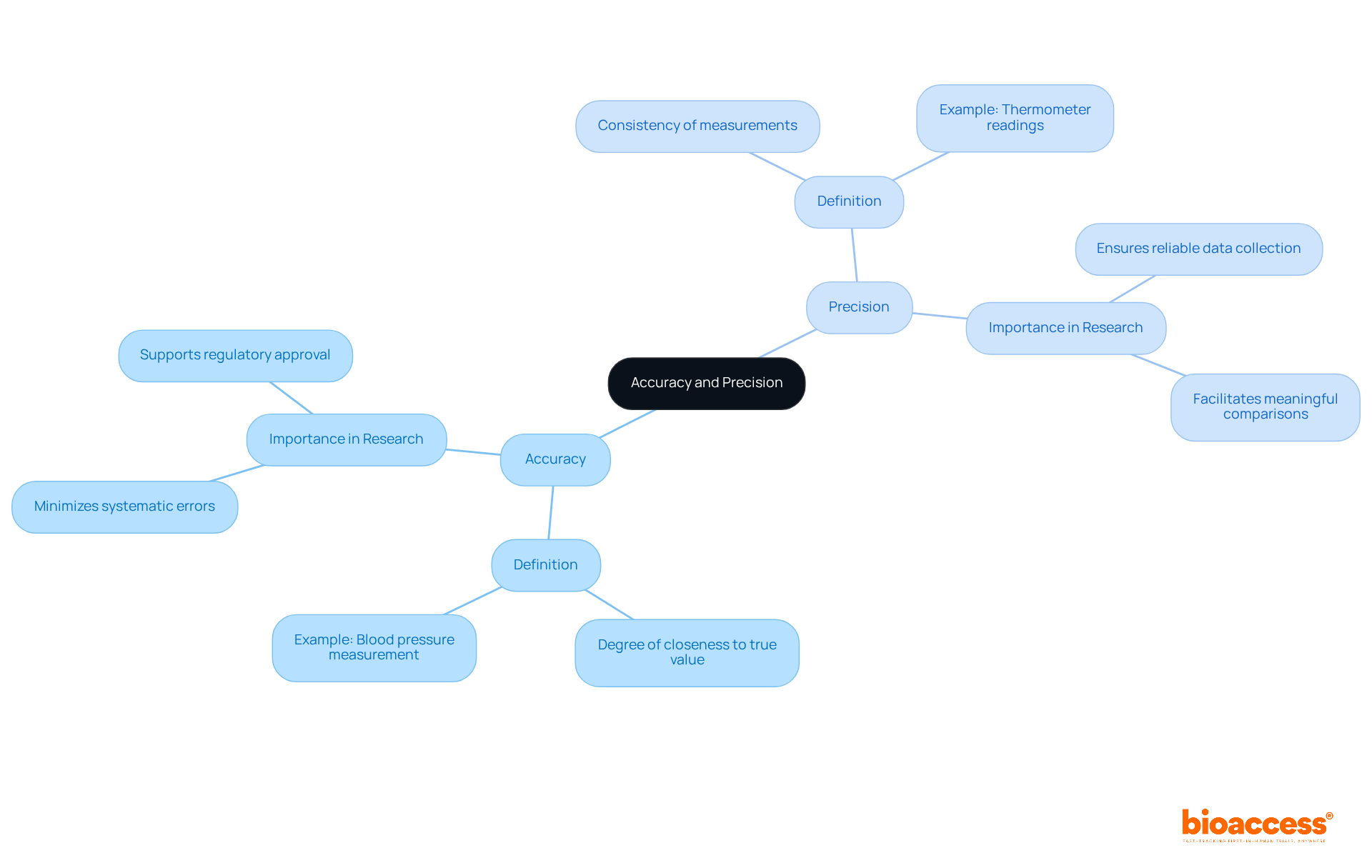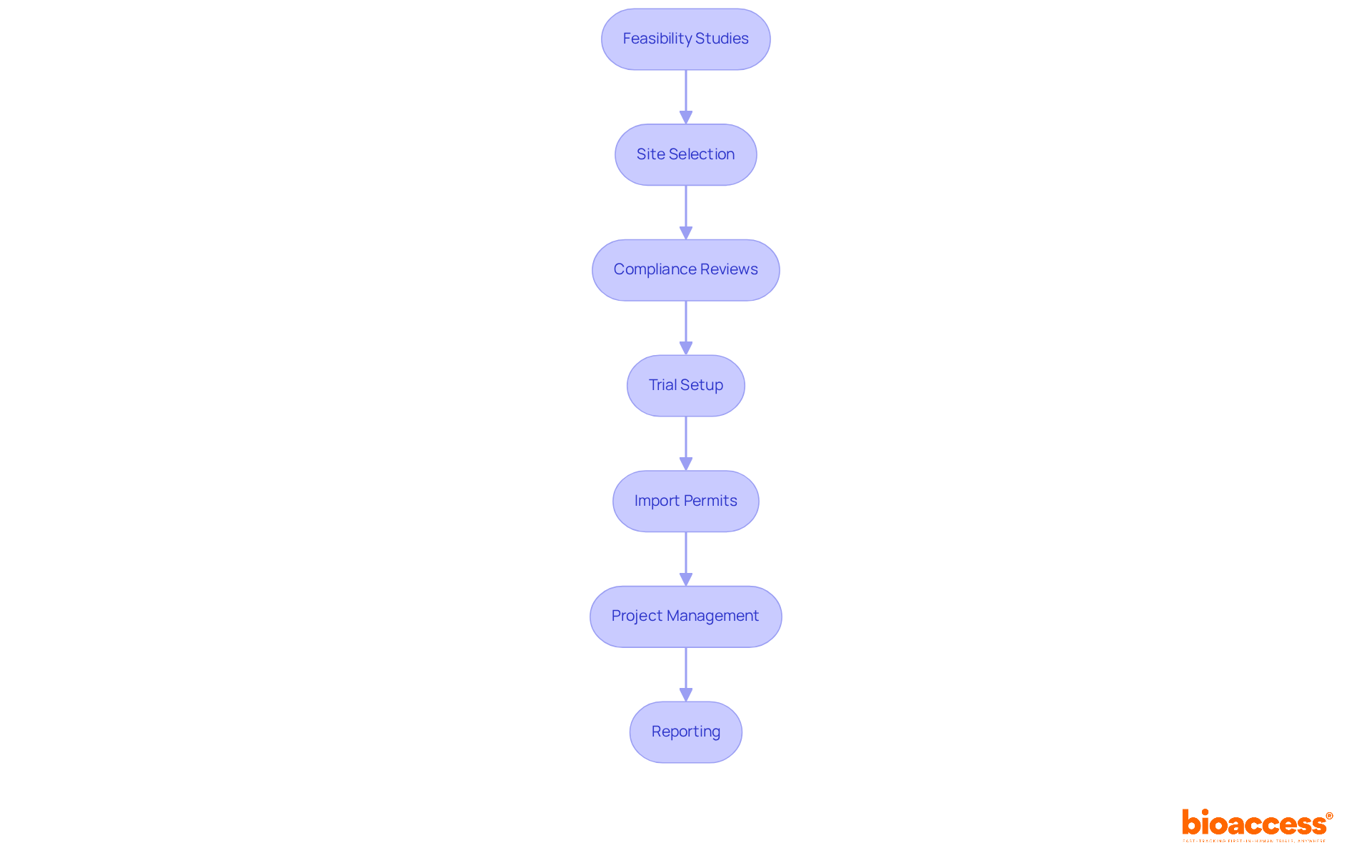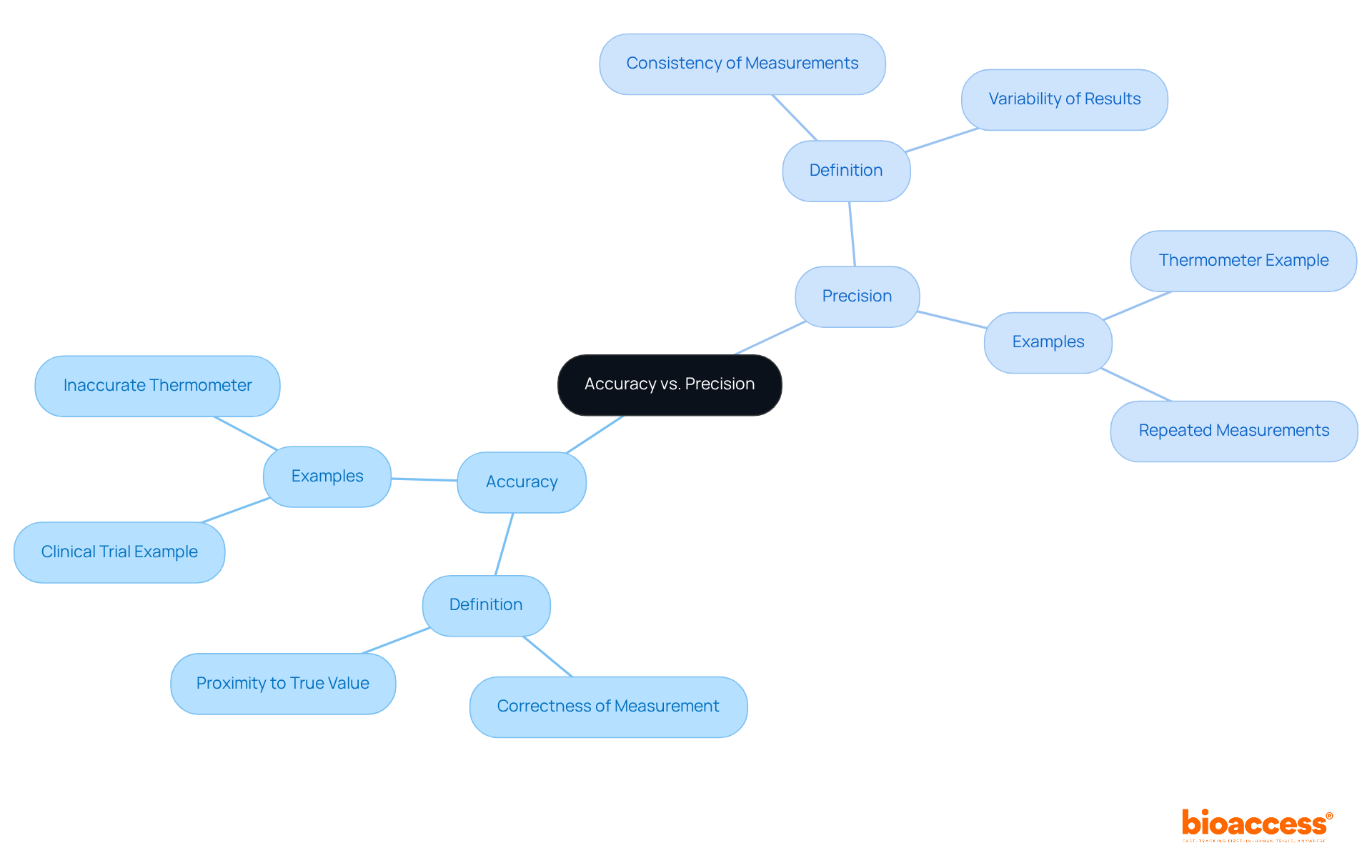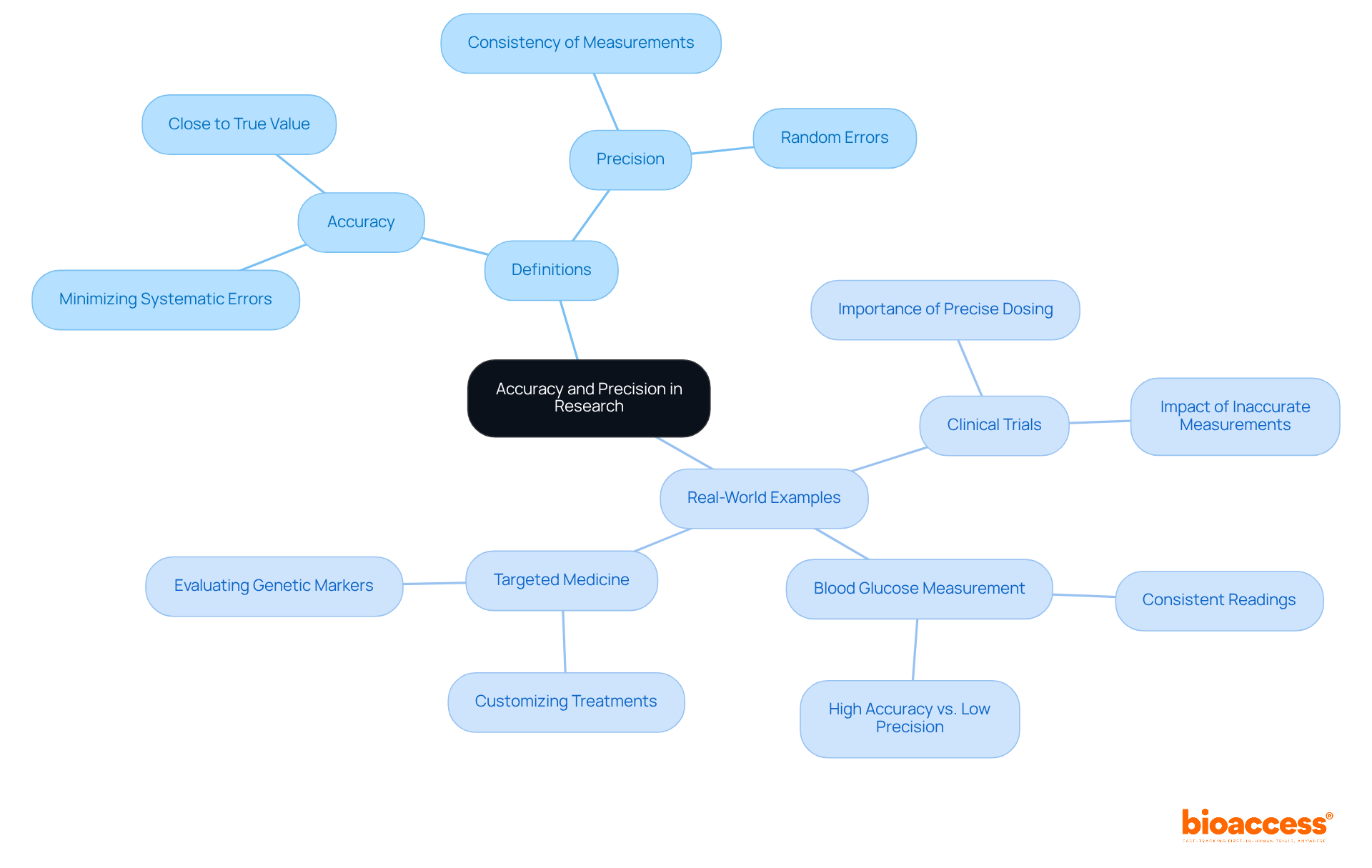


This article delineates the critical concepts of accuracy and precision within the realm of clinical research, underscoring their pivotal role in ensuring reliable and valid study outcomes.
Accuracy is defined as the degree to which measurements correspond with true values, while precision pertains to the consistency observed in repeated measurements. Both elements are indispensable for maintaining the integrity of medical research, as they directly influence the validity of results and, consequently, patient safety.
Understanding the concepts of accuracy and precision is crucial in the realm of clinical research, where the integrity of data can significantly influence medical outcomes. This article delves into essential definitions, historical evolution, and practical implications of these terms, underscoring their importance in ensuring reliable and valid research findings. As researchers strive for precision, they often grapple with the challenge of maintaining accuracy—leading to the pivotal question: how can the delicate balance between these two critical elements be achieved to enhance the quality of clinical trials?
The accuracy and precision definition explains that accuracy is the degree to which a measured value aligns with the true value or actual standard. In the realm of medical research, this indicates that study findings should truthfully represent the actual traits of the population under investigation. For instance, if a clinical trial measures blood pressure, the results should closely match the actual blood pressure levels of the participants.
Conversely, accuracy also pertains to the consistency of repeated measurements, indicating how reproducible results are under identical conditions. A precise measurement can yield the same results repeatedly; however, it may lack correctness if it consistently diverges from the true value. For example, if a thermometer consistently reads 2 degrees higher than the actual temperature, it is precise but not accurate.
A comparison for correctness can be likened to hitting the bullseye on a target, while exactness may be associated with arrows being closely clustered together, even if they do not strike the bullseye. Understanding the accuracy and precision definition is essential for evaluating the reliability and validity of research findings.
In research studies, high reliability and exactness are essential for ensuring that the information gathered can be relied upon to guide medical choices. Real-world examples illustrate this: in an evaluation of a new medication, if the results are both accurate and precise, they provide a solid foundation for regulatory approval and clinical application. Conversely, if a research project demonstrates low correctness yet high consistency, the results may be misleading, necessitating further inquiry to address any biases.
Therefore, understanding the subtleties of the accuracy and precision definition and its connection to reliability is vital for creating effective research and interpreting results clearly.

The accuracy and precision definition are paramount to the integrity of medical research, significantly influencing the validity of results. Precise data is crucial for ensuring that research conclusions accurately reflect medical realities, which is vital for developing effective treatments and interventions. Accuracy guarantees that outcomes are consistent and dependable, enabling researchers to reproduce investigations and validate results.
At bioaccess, our comprehensive clinical trial management services encompass:
All designed to enhance the precision of data collection. The implementation of Standardized Case Report Forms (CRFs) reduces variability among sites and researchers, while our Electronic Data Capture (EDC) systems significantly minimize errors associated with manual data entry, further improving data precision.
For example, the integration of the Medical & Safety Review (MSR) tool illustrates how centralized monitoring can enhance data precision by tracking all actions related to a record, thereby reducing variability and errors in data management. Inaccurate or imprecise data can lead to misleading conclusions, jeopardizing patient safety and hindering progress in medical science. Statistics indicate that a substantial portion of errors in health research stems from deficiencies in the accuracy and precision definition, highlighting the need for rigorous data management practices.
As Medha Datar observes, 'Inaccurate or compromised data can lead to regulatory delays, costly rework, and even the rejection of trial findings.' Therefore, maintaining high standards of correctness and precision is not merely a regulatory obligation but also an ethical imperative in clinical research, ensuring that patients benefit from safe and effective treatments.

The concepts of exactness and consistency have been paramount in scientific investigation since the inception of measurement in research. Early scientists acknowledged the necessity for reliable measurements to substantiate their hypotheses. As measurement methods evolved, so too did the understanding of these concepts, particularly with the advent of statistical quality control in the mid-20th century, which underscored the critical importance of the accuracy and precision definition in experimental design.
For instance, the FDA's guidance on analytical methods emphasizes the need for matrices to be spiked at various levels to effectively evaluate precision. Today, the accuracy and precision definition stands as a foundational principle in clinical research, shaping the development of protocols and methodologies that ensure the reliability of results.
Case studies, such as those exploring the quantification of phytochemicals, underscore the significance of precise measurements in regulatory contexts, where variability in raw materials can profoundly influence outcomes. Furthermore, the advancement of measurement techniques, including innovations in chromatographic methods, has bolstered the capacity to achieve reliable and reproducible results, reinforcing the importance of these concepts in steering researchers toward credible discoveries.

To distinguish between accuracy and exactness, it is essential to understand the accuracy and precision definition and their key characteristics. The accuracy and precision definition explains that accuracy refers to the correctness of a measurement, indicating how close it is to the true value. For instance, in a clinical trial measuring blood pressure, an accurate reading reflects the patient's actual blood pressure. In contrast, exactness relates to the consistency of measurements across multiple trials. A precise measurement yields similar results when repeated under the same conditions, regardless of whether those results are close to the true value.
For example, if a thermometer consistently shows 22.5 degrees Celsius when the true temperature is 21.5 degrees Celsius, it illustrates high precision but low correctness. Conversely, a thermometer that fluctuates widely but occasionally hits the true temperature would be considered accurate but not precise. A precise thermometer would yield an average temperature of 21.5 degrees Celsius, demonstrating the significance of precision in medical environments. Comprehending these differences is vital for researchers in planning investigations and analyzing data efficiently, particularly in relation to the accuracy and precision definition.
Examples in medical experiments underscore the significance of both exactness and meticulousness. Accurate dosing of medication is vital for patient safety, while precise measurements ensure that results are reliable and replicable. The case analysis titled 'Clinical Trials: Balancing Exactness and Precision' highlights that both correctness and exactness are crucial in medical environments to guarantee effective therapy and research integrity. By utilizing standardized operating procedures and regular calibration, researchers can enhance both correctness and exactness in their measurements, ultimately resulting in more reliable outcomes in medical research. Furthermore, it is essential to recognize that systematic errors can lead to precise but flawed results, underscoring the need for careful measurement practices.

In medical research, the accuracy and precision definition is paramount, as demonstrated through various studies. The accuracy and precision definition indicates that accuracy pertains to how close a measured value is to the true value, while exactness addresses random errors caused by variability. For instance, in a clinical trial evaluating a new medication, precise dosing is crucial; an incorrect dosage can lead to ineffective treatment or adverse effects. Equally significant is precision; when measuring blood glucose levels, consistent readings across multiple tests are essential to accurately evaluate the medication's efficacy. A study that consistently reports blood glucose levels within a narrow range, such as a device measuring to two decimal places, exemplifies high accuracy. However, if these readings consistently differ from the true value, it indicates low precision, potentially misleading researchers about the medication's effectiveness. Such scenarios underscore the critical need for both the accuracy and precision definition to ensure reliable and valid research outcomes.
Case analyses further illuminate this relationship. In targeted medicine, for example, customizing treatments based on personal genetics requires both accurate evaluations of genetic markers and precise dosing to enhance therapeutic effects. Similarly, in medication dosing, studies have shown that even slight inaccuracies can lead to significant variations in patient responses, highlighting the importance of meticulous measurement practices. In instances of poor accuracy combined with high exactness, it becomes essential to investigate the source of bias to ensure that the outcomes are trustworthy.
Expert insights bolster this perspective, emphasizing that dependable trials hinge on the accuracy and precision definition. A reliable study consistently yields both accurate and precise results, which are vital for scientific advancements and informed medical decision-making. Therefore, grasping and implementing these principles is fundamental for researchers striving to achieve meaningful and impactful results in clinical trials.

Understanding the distinction between accuracy and precision is crucial in the field of clinical research, as these concepts fundamentally impact the validity and reliability of study outcomes. Ensuring that measurements closely align with true values while also being consistently reproducible is essential for advancing medical knowledge and improving patient care. The integrity of research findings hinges on the careful application of these principles, making them indispensable in the clinical trial process.
Key insights throughout the article highlight the importance of both accuracy and precision in research methodologies. Accurate measurements ensure that the results reflect the true characteristics of the population being studied, while precise measurements allow for reliable replication of findings. The historical evolution of these concepts underscores their significance in scientific inquiry, with advancements in measurement techniques continually reinforcing their relevance in modern research. Real-world examples further illustrate how both accuracy and precision are critical in clinical settings, where even minor discrepancies can lead to significant implications for patient safety and treatment efficacy.
Ultimately, the pursuit of high standards in accuracy and precision is not merely a technical requirement; it is an ethical obligation that researchers must uphold. By prioritizing these principles, the medical research community can enhance the reliability of findings, foster trust in clinical trials, and ultimately contribute to the development of effective and safe treatments. Embracing the nuances of accuracy and precision will empower researchers to drive meaningful advancements in healthcare, ensuring that patients receive the best possible care based on trustworthy evidence.
What is the definition of accuracy and precision in research?
Accuracy refers to the degree to which a measured value aligns with the true value or actual standard, while precision indicates the consistency of repeated measurements. Accurate results reflect the true characteristics of the population studied, whereas precise results yield the same measurements consistently, even if they are not correct.
How do accuracy and precision impact medical research?
Accuracy and precision are crucial for the integrity of medical research as they influence the validity of results. Precise data ensures that research conclusions accurately reflect medical realities, which is essential for developing effective treatments and interventions. Accurate outcomes enable reproducibility and validation of research findings.
What are some methods used to improve accuracy and precision in clinical trials?
Methods to enhance accuracy and precision include the use of Standardized Case Report Forms (CRFs) to reduce variability among sites and researchers, and Electronic Data Capture (EDC) systems to minimize errors associated with manual data entry. Additionally, centralized monitoring tools like the Medical & Safety Review (MSR) tool help track actions related to records, reducing variability and errors.
What can happen if data in medical research is inaccurate or imprecise?
Inaccurate or imprecise data can lead to misleading conclusions, jeopardizing patient safety and hindering progress in medical science. It may result in regulatory delays, costly rework, or even rejection of trial findings, emphasizing the importance of maintaining high standards of accuracy and precision.
Why is it ethically important to maintain accuracy and precision in clinical research?
Maintaining high standards of accuracy and precision in clinical research is not only a regulatory obligation but also an ethical imperative. It ensures that patients benefit from safe and effective treatments, highlighting the responsibility researchers have to provide reliable and valid data.